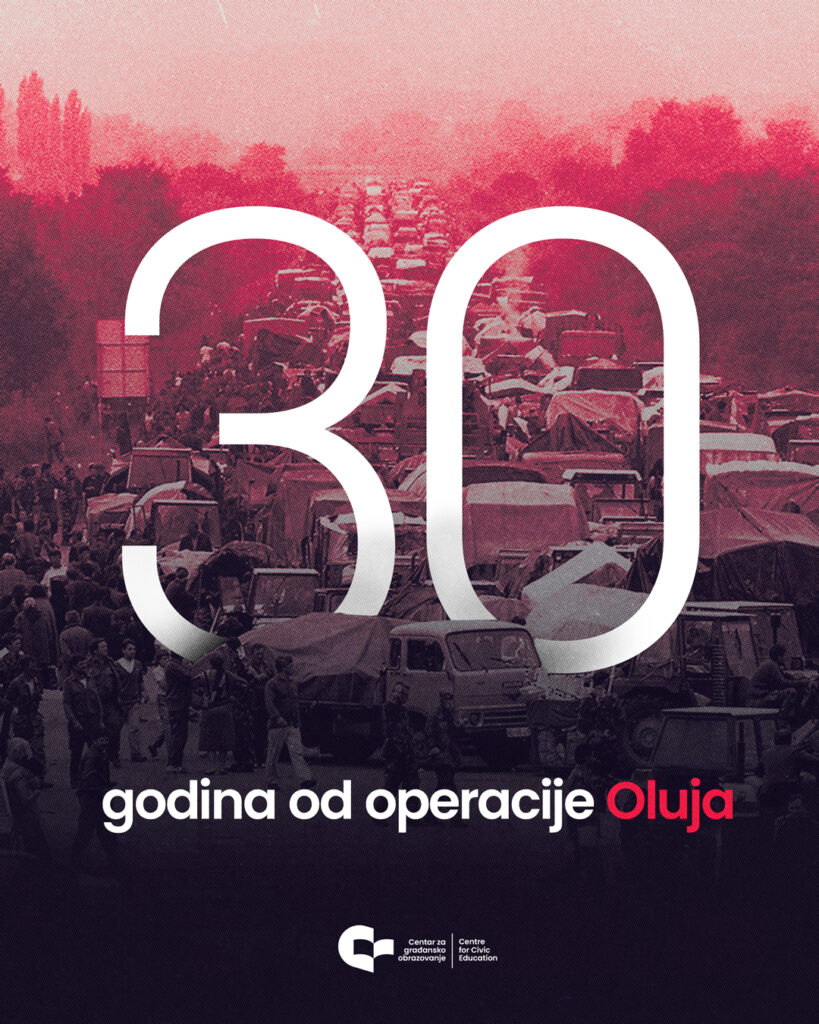On the 30th marking of the military-police operation “Storm” (Oluja), the Centre for Civic Education (CCE) expresses deep concern over the fact that justice for the victims of this operation has never been achieved. The four-day action, which began on 4 August 1995, not only marked the end of the Republic of Serbian Krajina but also led to the mass displacement of around 200,000 Serb civilians, systematic crimes, looting, and destruction of their property, as well as the killings of hundreds who chose to remain in their homes.
According to data of Documenta from Zagreb, which published a name-by-name list of human losses, with personal data and circumstances of death, 2,353 war victims were identified during and after “Operation Storm,” predominantly of Serb ethnicity (1,747), including 1,170 civilians, mainly aged 36 to 64 (995). The majority of deaths were caused by killings (1,073), followed by disappearances and deaths in combat.
The International Criminal Tribunal for the former Yugoslavia (ICTY) conducted proceedings against Croatian generals Ante Gotovina, Mladen Markač, and Ivan Čermak for crimes committed during and after “Operation Storm.” The trial ended with their acquittal. While the Trial Chamber initially convicted Gotovina and Markač (Čermak was acquitted), the Appeals Chamber later overturned those verdicts, citing insufficient evidence of individual criminal responsibility. However, despite the prosecution’s failure to prove guilt beyond a reasonable doubt, the verdicts unequivocally established that crimes against Serb civilians had been committed and described the operation as a “joint criminal enterprise.”

Time and facts have not prevented the victims of “Storm” from remaining hostages to political games between Croatia and Serbia. Instead of focusing on justice, truth, and dignified remembrance, both countries have reduced their approach to symbolic gestures – Croatia celebrates the day while refusing to confront its full legacy, and Serbia holds political commemorations that do not meet the needs of victims or foster genuine remembrance. Notably, in Serbia, not a single victim of “Storm” holds the official status of a civilian war victim, as the law excludes those harmed outside Serbia’s territory, systematically denying institutional support to refugees from Croatia. Furthermore, in 1995, a large number of these refugees were forcibly mobilized by Serbian forces and sent to battlefields in Bosnia and Herzegovina, resulting in additional casualties and further traumatization.
Instead of placing the victims at the center of public discourse, they are sidelined each year while politicians from both countries instrumentalize their suffering for internal and bilateral political agendas.
CCE warns that inadequate judicial processes, ending without convictions, and the absence of institutional recognition of victims undermine trust in the justice system and deepen societal divisions. This highlights the urgent need to address command responsibility, reparations, the fate of the missing, and to create a memorial culture that fosters empathy and remembrance rather than conflict.
CCE therefore calls on relevant institutions, political actors, and international organizations to take concrete steps toward realizing the rights of victims and building a more just society. Only through a responsible memory policy, the rule of law, and sincere reckoning with the past can we establish regional relations grounded in respect for victims, prevention of future crimes, and the promotion of reconciliation.
Damir Suljević, Human Rights Programme Coordinator
